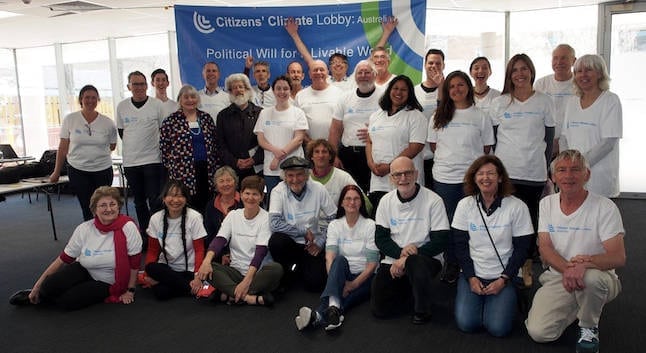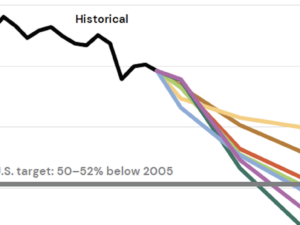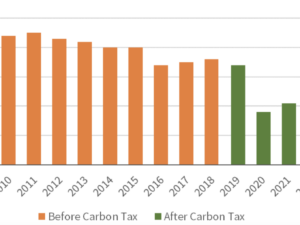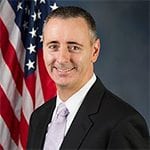
CCL Australia’s 3rd National Conference held in Canberra in September 2017
By Mary Gable
While Citizens’ Climate Lobby was founded in the U.S. and with the U.S. Congress in mind, its mission—and approach—applies anywhere. A carbon price can help drive a transition away from fossil fuels in any market economy, and engagement with policymakers works any place that citizens can shape the decisions of their elected officials. It’s maybe no surprise, then, that of the more than 700 CCL chapters that are active or being launched, about a quarter are located outside the United States.
One of CCL’s biggest non-U.S. contingents is in Australia, which has 17 active chapters and many more in launch phase. Our solid footing there might have to do with the fact that on climate change, Australians are dealing with many similar issues as Americans.
For starters, we’re both highly dependent on fossil fuels for energy, thanks to significant reserves of coal in Australia and oil and gas in the U.S. And we have many people in power who want to keep things that way. As a result, both nations are dealing with elected officials who are actively obstructing climate action—or outright denying that a problem exists. Not long after President Trump’s inauguration, the U.S. Environmental Protection Agency removed all content related to climate change on its website, and the administration proposed axing funding for climate change research from the federal budget. Meanwhile, Australia’s federal agency responsible for scientific research discontinued all funding for the National Climate Change Adaptation Research Facility.
These are disturbing headwinds. But in both countries, hope and momentum are growing. Australians and Americans alike are working for a just transition to a sustainable future, from blocking new fossil fuel infrastructure to supporting utility-scale renewables. As citizens of representative democracies, they are also both calling on politicians to act.
Australia’s history with carbon pricing
Australia differs from the United States in one important way: it’s already tried putting a price on carbon. The Australian Parliament passed the Clean Energy Act in 2011, and it took effect in 2012 at A$23 (about $25 USD) per ton.
But it didn’t last. The policy was highly divisive, helping lead to the ouster of Australia’s first female prime minister. Opposition leaders won the war of ideas, positioning the carbon price as a “tax” that would burden families and limit economic growth.
This wasn’t exactly true—renewable energy use increased and emissions fell under the carbon fee. But there were legitimate objections to the policy. As CCL pointed out, the fee was not completely revenue neutral and was applied to only the country’s 500 highest emitters—just 0.02 percent of businesses. The carbon price was repealed in 2014.
This legacy means that some of Australia’s members of Parliament are already familiar with the ins and outs of carbon pricing. Many hold strong opinions on the issue. That makes bipartisan coalition-building all the more important—and that’s where CCL comes in.
Building trust with MPs
According to members in Australia, CCL’s tried-and-true engagement tactics work, starting with finding common ground. Paula Samson, a founding member of CCL’s first Australia chapter, describes an interaction with a member of Parliament from a conservative federal electorate who was a vocal climate skeptic.
“I was apprehensive about the meeting,” Samson says. “Without the support of CCL, I never would have had the confidence to approach him.” Samson and fellow CCLers met first with the MP’s staff, and then with the MP himself.
“We agreed on the need to reduce air pollution, and learned that the MP was interested in electric vehicles,” says Samson. “Based on that conversation, the MP had an article published in a local paper declaring that Australia should be a leading manufacturer of battery storage devices for solar power. That was a big win.”
Another member of Parliament admitted that he knew next to nothing about climate change. CCL members guided him up the scale of support, ultimately resulting in him contributing to a grant application for community organizations to buy and install solar photovoltaic systems.
Australia’s parliament currently skews conservative, but Samson and Jodie Green, National Coordinator for CCL Australia, say that members of all parties have accepted their meetings. “We’ve never really been put off,” Green says. “Even those who are not actively supportive of our policy have been open to conversation, and many have asked us to keep them up-to-date on what we’re doing.”
Given Parliament’s recent experience with carbon pricing and the concerns it raised about cost to Australians, many MPs are interested in economic modeling. Australia doesn’t yet have its own version of CCL’s REMI study, which demonstrated that a revenue-neutral carbon price would positively affect the U.S. economy.
That could someday change. “When we meet with MPs and other leaders, we ask them what types of modeling they would like to see, and what data they want collected,” says Samson. “That’s another way we can make inroads.”
Engaging across distances
Just like our respective political climates, CCL in Australia operates much like chapters in the U.S. do—with a few critical differences.
There are active chapters covering 130 of Australia’s 150 federal electorates, with presence in the major cities of Perth, Sydney, Canberra, Melbourne, Adelaide, and Brisbane. Because many parts of Australia are sparsely populated, chapters occasionally join up for meetings or even meet remotely. “We do a lot of Zooming,” Green says, referring to the video conferencing tool many CCL chapters use to stay connected.
CCL Australia has organized four National Conferences in Canberra, each followed by two days of lobbying at Canberra’s Parliament House. Members hope to meet with every member of Parliament in 2018, and chapters are planning additional training, conferences and lobby days to reach this goal.
Another important priority is to help spur the creation of a multi-partisan coalition in support of climate action in Parliament (much like the Climate Solutions Caucus in the U.S. House of Representatives). The group already has a name: Parliamentary Friends of Climate Solutions. Now all it needs is members. Ten are required to form an official group, and several MPs, including multiple conservatives, have expressed interest. “We have three political parties, so it’s a little more complicated,” Samson says, although two of the three parties operate as a coalition. Members of CCL Australia are currently developing a strategy for launching this group and hope to do so by the end of the year.
To meet their chapters’ needs, CCL Australia promotes U.S. monthly video calls, but also produces their own. Members stay active on Facebook and Twitter, and share updates on YouTube and through their own website. They also encourage their members to register and join the Australia group on CCL Community. Anyone is welcome to join the conversation.
How else can CCLers across various ponds support CCL Australia? “Let your friends and family here know about us,” Samson says. “We’re a friendly bunch, and we’re doing effective work. It’s an exciting time to be a part of CCL.”





